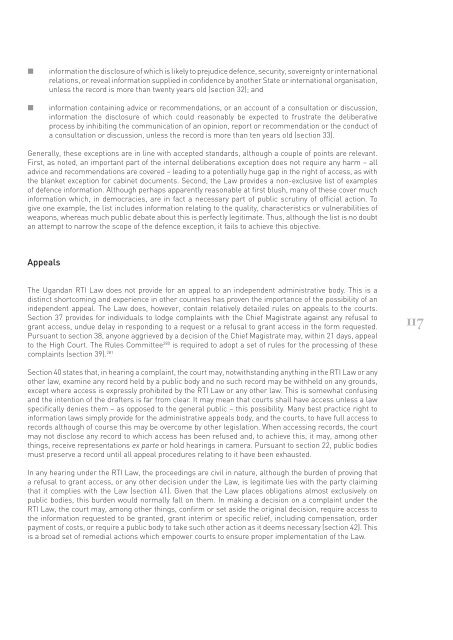Freedom of Information: A Comparative Legal Survey - Federation of ...
Freedom of Information: A Comparative Legal Survey - Federation of ...
Freedom of Information: A Comparative Legal Survey - Federation of ...
Create successful ePaper yourself
Turn your PDF publications into a flip-book with our unique Google optimized e-Paper software.
information the disclosure <strong>of</strong> which is likely to prejudice defence, security, sovereignty or international<br />
relations, or reveal information supplied in confi dence by another State or international organisation,<br />
unless the record is more than twenty years old (section 32); and<br />
information containing advice or recommendations, or an account <strong>of</strong> a consultation or discussion,<br />
information the disclosure <strong>of</strong> which could reasonably be expected to frustrate the deliberative<br />
process by inhibiting the communication <strong>of</strong> an opinion, report or recommendation or the conduct <strong>of</strong><br />
a consultation or discussion, unless the record is more than ten years old (section 33).<br />
Generally, these exceptions are in line with accepted standards, although a couple <strong>of</strong> points are relevant.<br />
First, as noted, an important part <strong>of</strong> the internal deliberations exception does not require any harm – all<br />
advice and recommendations are covered – leading to a potentially huge gap in the right <strong>of</strong> access, as with<br />
the blanket exception for cabinet documents. Second, the Law provides a non-exclusive list <strong>of</strong> examples<br />
<strong>of</strong> defence information. Although perhaps apparently reasonable at fi rst blush, many <strong>of</strong> these cover much<br />
information which, in democracies, are in fact a necessary part <strong>of</strong> public scrutiny <strong>of</strong> <strong>of</strong>fi cial action. To<br />
give one example, the list includes information relating to the quality, characteristics or vulnerabilities <strong>of</strong><br />
weapons, whereas much public debate about this is perfectly legitimate. Thus, although the list is no doubt<br />
an attempt to narrow the scope <strong>of</strong> the defence exception, it fails to achieve this objective.<br />
Appeals<br />
The Ugandan RTI Law does not provide for an appeal to an independent administrative body. This is a<br />
distinct shortcoming and experience in other countries has proven the importance <strong>of</strong> the possibility <strong>of</strong> an<br />
independent appeal. The Law does, however, contain relatively detailed rules on appeals to the courts.<br />
Section 37 provides for individuals to lodge complaints with the Chief Magistrate against any refusal to<br />
grant access, undue delay in responding to a request or a refusal to grant access in the form requested.<br />
Pursuant to section 38, anyone aggrieved by a decision <strong>of</strong> the Chief Magistrate may, within 21 days, appeal<br />
to the High Court. The Rules Committee 280 is required to adopt a set <strong>of</strong> rules for the processing <strong>of</strong> these<br />
complaints (section 39). 281<br />
Section 40 states that, in hearing a complaint, the court may, notwithstanding anything in the RTI Law or any<br />
other law, examine any record held by a public body and no such record may be withheld on any grounds,<br />
except where access is expressly prohibited by the RTI Law or any other law. This is somewhat confusing<br />
and the intention <strong>of</strong> the drafters is far from clear. It may mean that courts shall have access unless a law<br />
specifi cally denies them – as opposed to the general public – this possibility. Many best practice right to<br />
information laws simply provide for the administrative appeals body, and the courts, to have full access to<br />
records although <strong>of</strong> course this may be overcome by other legislation. When accessing records, the court<br />
may not disclose any record to which access has been refused and, to achieve this, it may, among other<br />
things, receive representations ex parte or hold hearings in camera. Pursuant to section 22, public bodies<br />
must preserve a record until all appeal procedures relating to it have been exhausted.<br />
In any hearing under the RTI Law, the proceedings are civil in nature, although the burden <strong>of</strong> proving that<br />
a refusal to grant access, or any other decision under the Law, is legitimate lies with the party claiming<br />
that it complies with the Law (section 41). Given that the Law places obligations almost exclusively on<br />
public bodies, this burden would normally fall on them. In making a decision on a complaint under the<br />
RTI Law, the court may, among other things, confi rm or set aside the original decision, require access to<br />
the information requested to be granted, grant interim or specifi c relief, including compensation, order<br />
payment <strong>of</strong> costs, or require a public body to take such other action as it deems necessary (section 42). This<br />
is a broad set <strong>of</strong> remedial actions which empower courts to ensure proper implementation <strong>of</strong> the Law.<br />
117
















